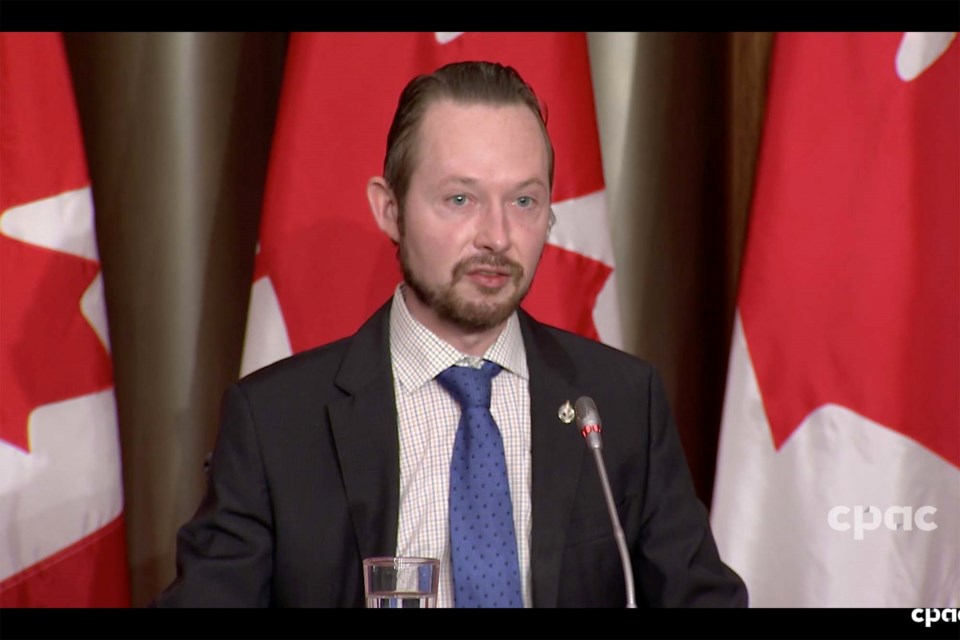St. Albert-Edmonton MP Michael Cooper sponsored a bill last week that would allow jurors to fully disclose information about jury proceedings to mental-health professionals when accessing support.
“How can one get better when one is unable to talk about the core of their injury? That is precisely where this legislation comes in,” said Cooper during a Nov. 25 press conference.
Cooper is the House of Commons sponsor for Bill S-206 — an act to amend the Criminal Code (disclosure of information by jurors) — which would allow members of a jury to disclose information related to jury proceedings to a health-care professional in certain circumstances.
The bill was introduced into the Senate by Conservative Sen. Pierre Boisvenu on Nov. 24 and passed first reading
Currently, the law does not allow jurors to disclose any information about a jury proceeding to anyone, including medical professionals who are bound by confidentiality rules. This becomes a problem if a juror suffers mental-health issues due to a difficult trial and needs help working through those issues.
The bill is based on recommendation number four of the House of Commons Standing Committee on Justice and Human rights report entitled Improving Support for Jurors in Canada, which concluded in May 2018.
During the study, the justice committee heard from jurors whose lives were changed by disturbing testimony they heard during trials.
“Some of them suffered severe mental-health problems, such as post-traumatic stress disorder. They say that the secrecy rule that applies to jurors prevents them from getting the mental-health services they need,” said Boisvenu.
Jurors are unable to disclose information due to Section 649 of the Criminal Code, which makes it an offence for a juror to disclose during his or her life lifetime, Boisvenu continued.
“This rule of secrecy is profoundly unfair to these men and women who are simply performing their civic duties. Being a juror in a criminal trial, such as that of convicted felon Paul Bernardo, can be extremely traumatic and can leave lifelong scars,” said Boisvenu.
Tina Daenzer served as juror number one on the Paul Bernardo trial in 1995. She is currently the CFO of the Canadian Juries Commission.
She said juries are a unique institution and “require ordinary citizens with no legal training to hear evidence, make sense of conflicting facts, and apply legal rules to reach a verdict.”
“While it's true, a small percentage of jurors have suffered extensive mental-health trauma — like myself — due to the graphic evidence, one of the top sources of stress of jurors is actually related to the verdict and the deliberation process.
“For many, once the trial ends, the agony begins; feelings of guilt, shame, regret, often set in. Feelings you're told not to talk about with anyone because Section 649 of the Criminal Code prohibits jurors [from] discussing this stress-inducing aspect of the trial,” said Daenzer during the press conference.
Daenzer said she would like to see the Criminal Code revised to allow jurors to seek mental-health supports.
The legislation is modeled after legislation in the Australian state of Victoria, said Cooper. It would “carve out a very narrow exception to the jury secrecy rule.”
Former jurors would be given the opportunity to discuss mental-health issues arising from jury service, including the deliberation process, with a healthcare provider, to get the support they need.
“The integrity of the secrecy rule will be protected, because again, disclosure will be in a strictly confidential post-trial context. [Medical professionals] are all bound by secrecy as well,” he said.
The bill has been introduced to Parliament numerous times over the years.
Cooper served on the justice committee while the study was taking place. He also introduced similar legislation, Bill C-417, during the 42nd Parliament in 2018. That bill did not pass the Senate due to the 2019 election being called, despite receiving unanimous support.
“Immediately after the 2019 election, I reached out to Sen. Boisvenu. And Sen. Boisvenu, along with Sen. Moncion, championed Bill S-207. But unfortunately, again, we weren't able to get approved due to COVID,” said Cooper.
Cooper said it is time to “simply get it done.”
“Jurors play an integral role in the administration of justice in Canada, often at a considerable personal cost. We owe it to them to see the speedy passage of this legislation.”




